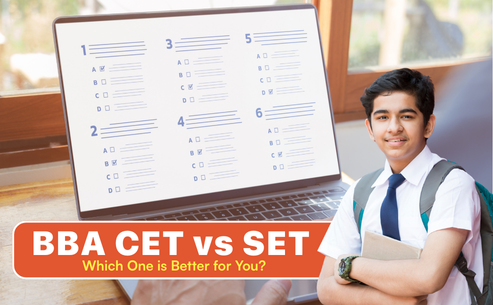Choosing the right management course after Class 12 can confuse many students. With growing interest in business, finance, marketing, and entrepreneurship, two popular undergraduate paths have emerged—BBA (Bachelor of Business Administration) and IPM (Integrated Programme in Management).
While both programs prepare students for a career in management, they differ significantly in structure, duration, admission process, and long-term benefits.
This blog will help you understand the key differences between BBA and IPM, compare them across multiple dimensions, and guide you in choosing the right career based on your goals, interests, and future plans.
Whether aiming for the prestigious IIMs or exploring private universities offering top-notch BBA programs, this article breaks down everything you need—from fees and placements to entrance exams and career scope.
What is BBA?
BBA (Bachelor of Business Administration) is a 3-year undergraduate program designed to introduce students to the core concepts of business and management. It focuses on building foundational knowledge in marketing, finance, human resources, operations, entrepreneurship, and business law.
BBA is a popular choice among students who want to pursue a career in business or management and may later opt for an MBA or professional roles in the corporate world.
Key Highlights of BBA
| Feature | Details |
| Duration | 3 Years (6 Semesters) |
| Degree | Bachelor’s in Business Administration |
| Eligibility | Class 12 pass from any stream (some institutes require English and Math) |
| Popular Entrance Exams | CUET, NPAT (NMIMS), SET (Symbiosis), UGAT, Christ University Entrance Test |
| Top Colleges | Shaheed Sukhdev College of Business Studies (DU), NMIMS Mumbai, Symbiosis (SCMS), Christ University, Jain University, etc. |
| Specializations | Finance, Marketing, HR, International Business, Entrepreneurship, Business Analytics |
| Course Focus | Theoretical and practical understanding of business processes |
| Career Path | Jobs after graduation or pursue MBA via CAT, XAT, etc. |
Advantages of BBA
- Shorter course duration (3 years).
- Flexibility to pursue an MBA from top IIMs or international B-schools after graduation.
- Availability of specializations for industry-specific careers.
- Relatively lower fees compared to IPM.
BBA offers a balanced foundation for students who are interested in business and want the flexibility to explore their options after graduation. It is ideal for those who may not want to commit to a 5-year integrated program right after Class 12.
What is IPM?
IPM (Integrated Programme in Management) is a 5-year dual-degree program that combines BBA + MBA and is offered by select Indian Institutes of Management (IIMs). It is the only way to enter the IIMs after Class 12 without appearing for CAT later.
This program is designed for high-achieving students who are clear about pursuing a long-term career in business management and leadership roles.
The IPM program builds a strong foundation in quantitative aptitude, communication, economics, and humanities in the first three years, followed by a full-fledged MBA curriculum in the last two years (same as regular PGP students at IIMs).
Key Highlights of IPM
| Feature | Details |
| Duration | 5 Years (3 years BBA + 2 years MBA) |
| Degree | Dual Degree – BBA & MBA |
| Eligibility | Class 12 pass with specific percentage and age criteria (varies by IIM) |
| Entrance Exams | IPMAT (IIM Indore & Rohtak), JIPMAT (IIM Jammu & Bodhgaya), SAT (for IIM Ranchi) |
| Top Institutes Offering IPM | IIM Indore, IIM Rohtak, IIM Ranchi, IIM Jammu, IIM Bodhgaya |
| Course Focus | Holistic development – quantitative skills, social sciences, communication, and core management |
| Career Path | MBA-level placements after 5 years from IIMs |
Benefits of IPM
- Direct entry into top IIMs after Class 12.
- No need to appear for CAT to get into an MBA.
- Premium placements and brand value of IIMs.
- Strong curriculum designed for early leadership development.
IPM is ideal for students who are clear about building a long-term career in management and want to leverage the IIM ecosystem from an early stage.
Key Differences Between BBA and IPM
While BBA and IPM are designed to build management skills after Class 12, they differ in multiple ways—including program structure, duration, institute type, admission process, and long-term outcomes.
The table below highlights the major differences between BBA and IPM to help you make an informed decision:
BBA vs IPM: A Detailed Comparison
| Factor | BBA | IPM |
| Full Form | Bachelor of Business Administration | Integrated Programme in Management |
| Course Duration | 3 Years | 5 Years |
| Degree Awarded | BBA | BBA + MBA (Dual Degree) |
| Institutes Offering | Private, Government & Central Universities | Select IIMs (Indore, Rohtak, Ranchi, Jammu, Bodhgaya) |
| Entrance Exams | CUET, NPAT, SET, UGAT, etc. | IPMAT (Indore/Rohtak), JIPMAT, SAT (IIM Ranchi) |
| Academic Structure | Focused on undergraduate business education | First 3 years: Foundation + UG; Last 2 years: MBA |
| Flexibility | Option to pursue MBA or jobs after BBA | Fixed 5-year commitment (some IIMs allow exit after 3 years) |
| Specializations Offered | Marketing, Finance, HR, IB, etc. | MBA specializations offered in final 2 years (same as PGP students) |
| Course Fees | ₹2 – ₹6 lakhs (approx. for 3 years) | ₹25 – ₹35 lakhs (approx. for 5 years) |
| Placement Timeline | After 3 years | After 5 years (IIM MBA-level placements) |
| ROI (Return on Investment) | Moderate – depends on college | High – due to IIM MBA placements and brand value |
Summary
- BBA is a great starting point if you’re looking for flexibility and lower financial commitment.
- If you’re clear about your management career and want to secure an IIM MBA seat early, IPM is the way to go.
Career Opportunities After BBA vs. After IPM
BBA and IPM open doors to diverse business, management, and entrepreneurship careers. However, opportunities’ depth and quality vary due to degree level, institutional reputation, and placement support.
Let’s compare the career scope after completing a standalone BBA versus the integrated IPM (BBA+MBA from IIMs):
Career Options After BBA
After a 3-year BBA, students can enter the job market or pursue postgraduate education (like MBA) to enhance their career prospects.
| Domain | Common Job Roles |
| Marketing | Sales Executive, Digital Marketer, Brand Associate |
| Finance | Financial Analyst, Accountant, Banking Associate |
| HR | HR Executive, Recruiter, Talent Acquisition Analyst |
| Operations | Supply Chain Coordinator, Logistics Executive |
| Startups/Entrepreneurship | Founders, Co-founders, Early employees |
| Higher Education | MBA (via CAT, XAT, GMAT), PGDM, MIM |
Career Options After IPM (BBA+MBA from IIMs)
Students who complete IPM receive an MBA degree from an IIM, which places them in the same league as flagship MBA graduates. The career prospects are significantly better, thanks to the IIM brand and corporate demand for MBA graduates.
| Domain | Common Job Roles |
| Consulting | Associate Consultant, Business Analyst |
| Finance | Investment Banker, Financial Analyst, Corporate Finance |
| Marketing | Brand Manager, Product Manager, Digital Marketing Lead |
| Operations & Supply Chain | Operations Manager, Supply Chain Analyst |
| General Management | Management Trainee, Strategy Analyst |
| Tech & Analytics | Business Analyst, Data Analyst, Product Analyst |
Placement Outcomes
| Parameter | BBA (Top Colleges) | IPM (IIM Indore/Rohtak) |
| Average Package | ₹5–8 LPA | ₹20–25 LPA (for MBA batch) |
| Top Recruiters | Deloitte, KPMG, ICICI, HDFC, startups | McKinsey, BCG, Goldman Sachs, Google, Amazon, Accenture |
| Job Roles | Executive-level | Mid to senior-level management roles |
| Alumni Network | Limited | Strong IIM alumni network across industries |
Verdict
- BBA provides good early exposure and job opportunities but often needs to be followed by an MBA for higher roles.
- IPM leads to premium MBA placements and faster career growth, especially for those who want a head start in the corporate world.
Who Should Choose BBA?
A BBA program is best suited for students who want early exposure to business and management principles but also value flexibility in choosing their career or higher education path after graduation. It’s ideal for those who prefer to keep their options open.
Here are the profiles of students who should consider pursuing a BBA:
Suitable For:
| Profile Type | Why BBA is a Good Fit |
| Undecided about long-term career plans | BBA gives 3 years to explore interests before committing to an MBA or another specialization. |
| Aspirants targeting CAT/XAT for MBA later | Students can prepare for competitive MBA entrances after BBA with a focused strategy. |
| Those seeking cost-effective UG programs | BBA is more affordable compared to IPM and allows flexibility to choose MBA colleges based on ROI. |
| Students who may want to study abroad later | BBA acts as a strong UG foundation for MS/MBA abroad via GMAT/IELTS. |
| Interested in early jobs or entrepreneurship | Students can start working after graduation or explore business/startup ideas with practical knowledge. |
| Those who want specific specializations early | BBA programs often allow early specialization in Marketing, Finance, HR, etc., which IPM typically doesn’t. |
Key Advantages of Choosing BBA
- Lower financial risk and time commitment (3 years)
- Opportunity to build real-world experience before MBA
- Wide range of college options across India
- Strong stepping stone for CAT/GMAT prep
- Flexibility to switch career paths after graduation
Ideal Colleges for BBA
- Shaheed Sukhdev College of Business Studies (SSCBS), DU
- NMIMS Mumbai
- Symbiosis Centre for Management Studies (SCMS)
- Christ University, Bengaluru
- Jindal Global Business School
- Loyola College, Chennai
BBA is a wise choice for students looking for a well-rounded undergraduate education in business without immediately committing to a 5-year path.
Who Should Choose IPM?
The Integrated Programme in Management (IPM) is an excellent choice for highly motivated, academically strong students who are already committed to a long-term career in management. It offers an exclusive opportunity to join India’s most prestigious management institutions—IIMs—right after Class 12.
This program is ideal for students who value structure, consistency, and brand reputation and want to skip the uncertainty and pressure of preparing for CAT later.
Suitable For:
| Profile Type | Why IPM is a Good Fit |
| Students aiming for top IIMs early | Secure an IIM MBA seat after Class 12—no need for CAT, GDPI later. |
| High academic achievers in school | IPMAT and JIPMAT exams are aptitude-intensive and suited for strong performers. |
| Students looking for a long-term, structured path | No need to switch colleges or reapply after UG—5-year continuity. |
| Those who prefer academic consistency | Well-designed curriculum with strong academic mentoring throughout the program. |
| Students focused on premium placements | Direct entry into the IIM MBA batch gives access to top recruiters and high salaries. |
| Students who dislike the CAT race | Avoid the stress of CAT coaching, retakes, and uncertainty after graduation. |
Key Advantages of Choosing IPM
- Entry into top-tier IIMs without competing in the CAT pool later
- MBA-level placements from McKinsey, BCG, Google, Goldman Sachs, etc.
- High Return on Investment (despite high fees)
- Personality and leadership development through a diverse curriculum
- Peer group and alumni network of India’s best management talent
- Exposure to real-world projects, internships, and case studies from year 1
Ideal IPM Institutions
| Institute | Entry Exam | Unique Features |
| IIM Indore | IPMAT Indore | Flagship IPM program, high placement packages |
| IIM Rohtak | IPMAT Rohtak | Good for consulting/finance aspirants |
| IIM Ranchi | SAT + WAT/PI | Offers BBA-MBA through international assessments |
| IIM Jammu | JIPMAT | Affordable IIM education in a fast-growing institution |
| IIM Bodhgaya | JIPMAT | Emerging IIM with good faculty and resources |
IPM is ideal for focused students who want a premium MBA education early and bypass the hyper-competitive entrance process post-graduation.
Common Myths Around BBA & IPM
Many students and parents make decisions based on incomplete information or misconceptions about BBA and IPM courses. Let’s clarify some of the most common myths and set the record straight.
Myth vs Reality Table
| Myth | Reality |
| “BBA students can’t get into IIMs.” | Absolutely false. Many BBA graduates crack CAT and get into top IIMs for their MBA. |
| “IPM students don’t need to study hard after selection.” | Incorrect. IPM is academically rigorous and requires consistent performance for MBA promotion. |
| “You must choose between BBA and IPM without knowing your interest.” | Not true. You can apply to both and choose later based on results, counselling, and preference. |
| “IPM is just a longer BBA program.” | Wrong. IPM combines a broad-based undergrad curriculum with a full MBA program, not just an extended BBA. |
| “CAT is the only way into IIMs.” | False. IPMAT and JIPMAT offer a direct IIM entry route after Class 12. |
| “BBA is less valuable if not followed by MBA.” | Not necessarily. BBA graduates can get jobs, start businesses, or study abroad—MBA is optional, not mandatory. |
| “IPM doesn’t offer specialization.” | Misleading. IPM students choose MBA specializations in the last two years like any other PGP student. |
| “Only commerce students can apply for BBA/IPM.” | Wrong. Students from any stream (Science, Commerce, Humanities) can apply if they meet the eligibility criteria. |
Understanding the truth behind these myths will help you make better academic and career decisions. Always base your choices on facts, not assumptions.
IBM Exams vs BBA Exams: Syllabus & Difficulty
BBA and IPM programs have different entrance tests, and the required preparation level can vary greatly. IPM entrance exams like IPMAT are more challenging and quantitative-focused. In contrast, BBA entrances like CUET and NPAT are relatively moderate and broader in scope.
The following tables will help you compare the exam structure, syllabus, and difficulty level of major BBA and IPM entrance tests.
IPM Entrance Exams Overview
| Exam | Conducting Body | Target Institutes | Difficulty |
| IPMAT Indore | IIM Indore | IIM Indore | High |
| IPMAT Rohtak | IIM Rohtak | IIM Rohtak | Moderate |
| JIPMAT | NTA | IIM Jammu, IIM Bodhgaya | Easy–Moderate |
| SAT + WAT/PI | College Board | IIM Ranchi | High |
IPMAT & JIPMAT Syllabus
| Section | Key Topics |
| Quantitative Ability | Arithmetic, Algebra, Geometry, Number System, Modern Math, Data Interpretation |
| Verbal Ability | Reading Comprehension, Para Jumbles, Vocabulary, Grammar |
| Logical Reasoning (in JIPMAT & Rohtak) | Series, Puzzles, Syllogisms, Coding-Decoding, Blood Relations |
BBA Entrance Exams Overview
| Exam | Conducting Body | Target Institutes | Difficulty |
| CUET (UG) | NTA | Central Universities (DU, BHU, JMI, etc.) | Easy–Moderate |
| NPAT | NMIMS | NMIMS Mumbai & other campuses | Moderate |
| SET | Symbiosis International | SCMS Pune, Noida, Nagpur | Moderate |
| Christ Entrance Test | Christ University | Bengaluru & other campuses | Moderate |
BBA Exam Syllabus (CUET, NPAT, SET)
| Section | Key Topics |
| Quantitative Aptitude | Arithmetic, Percentages, Ratio, Time-Speed-Distance |
| English / Verbal | Reading Comprehension, Grammar, Vocabulary |
| Logical Reasoning | Series, Coding-Decoding, Direction Sense, Venn Diagrams |
| General Awareness (for some exams) | Current Affairs, Static GK, Business Awareness |
Summary Comparison
| Parameter | IPM Exams | BBA Exams |
| Quant Difficulty | High (especially IPMAT Indore) | Low–Moderate |
| Reasoning Weightage | Present in Rohtak & JIPMAT | Standard in most BBA exams |
| Verbal Difficulty | Moderate | Easy–Moderate |
| GK Section | Not included | Sometimes included |
| Overall Prep Time Needed | 6–9 months (with mock test practice) | 3–6 months |
The IPMAT (Indore) is the most competitive, requiring strong math aptitude and speed. In contrast, BBA exams like CUET or SET are easier and more accessible to a broader range of students.
BBA vs IPM: Fees and ROI
One of the most crucial aspects while choosing between BBA and IPM is evaluating the total investment vs the return you can expect after completing the course. While IPM programs at IIMs demand a significantly higher financial investment, they also promise much higher placement packages and long-term career value.
Here’s a detailed comparison of course fees and return on investment (ROI) between BBA and IPM.
Course Fee Comparison
| Institute Type | Program | Total Fees (Approx.) |
| IIM Indore | IPM (5 Years) | ₹32–34 Lakhs |
| IIM Rohtak | IPM (5 Years) | ₹31–33 Lakhs |
| IIM Jammu / Bodhgaya | IPM (5 Years) | ₹28–30 Lakhs |
| NMIMS Mumbai | BBA (3 Years) | ₹9–10 Lakhs |
| Symbiosis SCMS Pune | BBA (3 Years) | ₹7–9 Lakhs |
| DU – SSCBS (CUET-based) | BBA (3 Years) | ₹50,000 – ₹1.5 Lakhs |
| Christ University | BBA (3 Years) | ₹6–7 Lakhs |
Placement & ROI Comparison
| Program | Avg. Package | Top Package | ROI Verdict |
| IPM – IIM Indore | ₹25 LPA (MBA phase) | ₹1 Cr+ | High ROI |
| IPM – IIM Rohtak | ₹18–20 LPA (MBA phase) | ₹40–60 LPA | High ROI |
| BBA – NMIMS | ₹5–6 LPA | ₹9–12 LPA | Moderate ROI |
| BBA – Symbiosis SCMS | ₹4–5 LPA | ₹8–10 LPA | Moderate ROI |
| BBA – DU (SSCBS) | ₹6–7 LPA | ₹12–15 LPA | Excellent ROI (Low fees + decent salary) |
| BBA – Christ Univ. | ₹4–5 LPA | ₹8–10 LPA | Moderate ROI |
Key Insights
- IPM is expensive but pays off well, especially if you complete the MBA phase from IIM Indore or Rohtak.
- BBA from DU (SSCBS) offers the best value for money due to low fees and decent placements.
- Private BBA programs (NMIMS, Symbiosis) can be costly with limited ROI unless followed by an MBA.
- ROI depends on your performance, college reputation, and postgraduate plans.
Bottom Line:
If you are looking for prestige, long-term stability, and elite placements, and your family can afford the investment, IPM is a great bet. BBA is a flexible and safer starting point if you’re cost-conscious or unsure about long-term commitment.
Real Student Scenarios (Use Case Examples)
To better understand how your goals and circumstances can influence the choice between BBA and IPM, here are realistic use-case scenarios of students with different career paths and decision-making factors.
Case 1: Riya – BBA + MBA via CAT (Flexible Route)
- Background: Commerce student, 85% in Class 12, unsure about long-term goals.
- Decision: Joined Shaheed Sukhdev College (DU) for BBA.
- Why: Low cost, flexibility, and a chance to prepare for CAT after BBA.
- Outcome: I cracked CAT in the final year and joined IIM Kozhikode for an MBA.
Verdict: BBA was the right choice because it allowed her to explore options and aim higher without early pressure.
Case 2: Arjun – Cracked IPMAT Indore (Straight to IIM)
- Background: Science stream topper, strong in Math and English.
- Decision: Focused entirely on IPMAT Indore prep in Class 12.
- Why: I wanted a direct, elite pathway into IIM and to skip the CAT rat race.
- Outcome: Got selected for IPM at IIM Indore, now pursuing MBA with ₹28 LPA PPO in hand.
Verdict: IPM was perfect for his clarity, ambition, and academic strength.
Case 3: Kabir – BBA from NMIMS, Later Switched to Entrepreneurship
- Background: Passionate about digital marketing, average academics.
- Decision: Took NPAT and joined NMIMS Mumbai BBA.
- Why: Wanted early exposure to corporate and startup culture.
- Outcome: After graduation, he started his own digital marketing agency and didn’t pursue an MBA.
Verdict: BBA allowed flexibility and practical exposure that suited his entrepreneurial mindset.
Case 4: Meera – Missed IPMAT Cutoff, Took BBA & Tried Again
- Background: I aspired for IPM but narrowly missed the cutoffs for Indore and Rohtak.
- Decision: I was admitted to Christ University BBA and started CAT prep.
- Why: I didn’t want to waste a year and kept my future MBA target intact.
- Outcome: Cracked CAT in 3rd year, converted IIM Lucknow.
Verdict: A smart recovery route, proving BBA still keeps the IIM dream alive.
These examples show that BBA and IPM can lead to successful careers—your personal clarity, preparation, and long-term goals matter most.
Conclusion: Which is Better for You?
Both BBA and IPM are excellent options for students interested in business and management careers. However, they cater to different kinds of aspirants.
- BBA is an innovative and safe choice if you want a flexible path, prefer to explore your interests and aim to prepare for CAT later.
- If you are sure about a long-term career in management, want to skip the CAT race, and can commit to a 5-year journey, IPM is ideal—especially with the IIM brand and strong ROI.
Here’s a quick decision checklist:
| Preference | Best Fit |
| Early exposure + flexible exit | BBA |
| Direct entry to top IIMs | IPM |
| Lower financial commitment | BBA |
| Long-term structured growth | IPM |
| Career switch options | BBA |
| Strong placement & alumni network | IPM |
Final Word:
Your choice should align with your career goals, academic strengths, and financial comfort. If you’re still unsure, talk to a mentor or seek professional guidance to decide what best suits you.
Need Help Choosing Between BBA or IPM?
Still confused between BBA and IPM? Don’t worry — Tarkashastra is here to guide you.
Whether you’re aiming for top IIMs through IPMAT or planning to crack CUET, NPAT, or SET for BBA admissions, our mentors can help you:
- Evaluate your academic strengths
- Align your career goals
- Plan your entrance exam strategy
- Choose the right colleges
- Prepare a study roadmap tailored to you
Book a Free 1:1 Counselling Session Today!
- Personalized Guidance
- Expert Mentors (IIM 99%ilers)
- No Cost, No Pressure
WhatsApp Us Now or Visit www.tarkashastra.co.in to start your journey. Success in your career begins with the right decision. Let’s make it together.
FAQs About BBA vs IPM
1. What is the significant difference between BBA and IPM?
BBA is a 3-year undergraduate degree, while IPM is a 5-year integrated program (BBA + MBA) offered by select IIMs.
2. Which is better—BBA or IPM?
It depends on your goals. IPM offers early access to IIMs and top placements, while BBA provides flexibility and is more affordable.
3. Can I get into IIM after doing BBA?
Yes, you can appear for CAT after BBA and apply to IIMs for a regular MBA program.
4. Is CAT required for IPM?
No. IPM students enter through exams like IPMAT or JIPMAT and don’t need CAT for the MBA phase.
5. Can a Science student apply for BBA or IPM?
Yes, students from any stream (Science, Commerce, Humanities) can apply if they meet the eligibility criteria.
6. Are IPM placements the same as regular IIM MBA placements?
Yes. IPM students join the PGP batch in the last 2 years and get the same placement opportunities.
7. Which entrance exam is more challenging—IPMAT or CUET?
IPMAT (especially IIM Indore’s) is tougher and math-heavy. CUET is broader and generally easier.
8. Do IPM students study the same MBA curriculum?
Yes. In years 4 and 5, they join the IIM’s flagship MBA (PGP) program.
9. Is there an exit option in IPM after 3 years?
Some IIMs like Rohtak offer an exit with a BBA degree after 3 years, subject to policy.
10. Can I pursue an MBA abroad after BBA?
Yes. A BBA is valid for applying to MBA and other master’s programs abroad (via GMAT/GRE).
11. How expensive is the IPM program?
IPM programs at IIMs cost around ₹28–35 lakhs in total for 5 years.
12. Is BBA a good course if I don’t want to do an MBA?
You can still work in business roles, pursue entrepreneurship, or opt for other PG options.
13. Do IPM students face pressure to perform every year?
Yes. Progression to the MBA phase often depends on meeting minimum academic standards.
14. Can I apply for both the BBA and IPM exams simultaneously?
Absolutely. Many students appear for CUET, IPMAT, JIPMAT, and NPAT in the same season.
15. What are the top colleges for BBA in India?
Top colleges include SSCBS (DU), NMIMS, SCMS (Symbiosis), Christ University, and Loyola.
16. Which has better ROI—BBA or IPM?
IPM offers higher ROI due to IIM MBA placements, but BBA from low-fee government colleges can also be excellent.
17. Is the syllabus for IPMAT very tough?
IPMAT (Indore) has high-level math (up to Class 11–12), while Rohtak and JIPMAT are relatively more straightforward.
18. Does IPM include internships and corporate exposure?
IPM includes internships, projects, exchange programs, and MBA-style case-based learning.
19. Will BBA prepare me well for CAT?
Yes, especially if you study math/statistics in college and start CAT prep early.
20. How should I choose between BBA and IPM?
Consider your clarity, academic strengths, financial resources, and readiness for a 5-year commitment.







